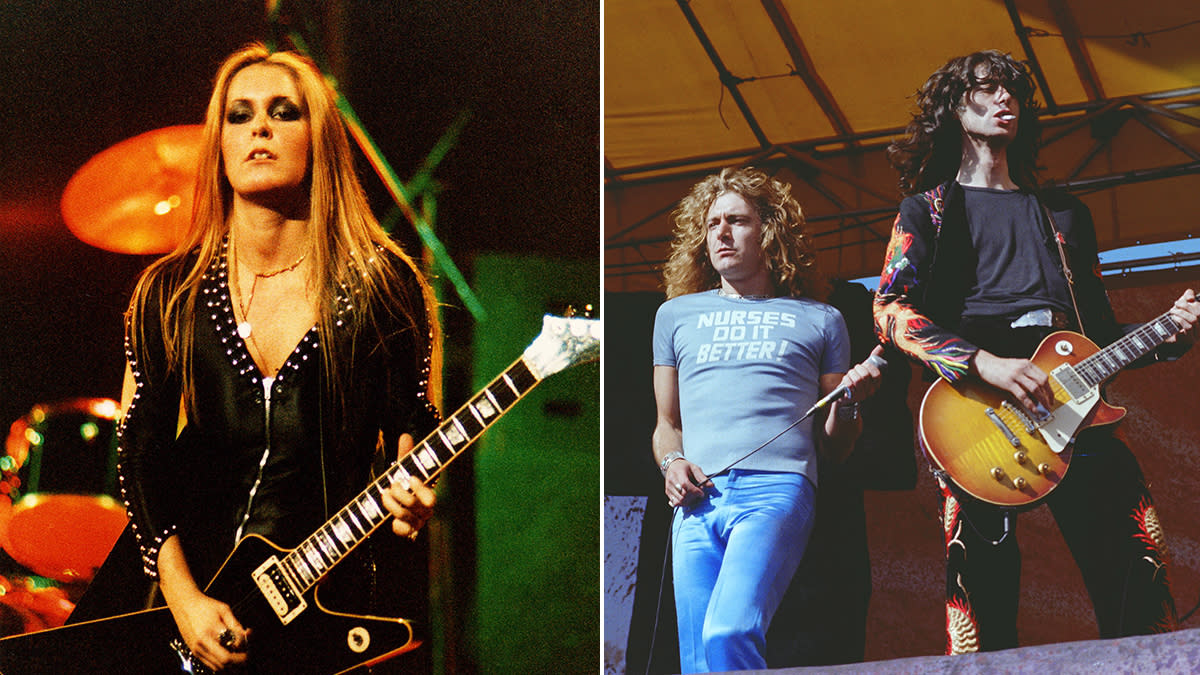“I thought, ‘He’s got to be joking,’ because John Paul Jones is God on bass, as far as I’m concerned”: How Lita Ford almost ended up joining Led Zeppelin – on bass

- Oops!Something went wrong.Please try again later.
- Oops!Something went wrong.Please try again later.
- Oops!Something went wrong.Please try again later.
- Oops!Something went wrong.Please try again later.
In the early '70s, Led Zeppelin pulled up to a crossroads. After five albums and years of rigorous touring, the band’s bass guitar player, John Paul Jones, was poised to take a step back from the fray, with the intention of spending more time with his family.
As such, Robert Plant and Jimmy Page braced themselves with the very real possibility that they’d need to recruit someone to stand in Jones’ shoes – to hold down the Led Zep low-end for the foreseeable future.
One particular individual who apparently came close to getting the gig was Lita Ford – the glam metal guitar icon, who at the time was the 17-year-old lead guitarist of the all-female rock outfit, The Runaways.
Rumors of Ford almost joining Led Zeppelin to replace Jones – on what wasn’t even her main instrument, no less – have permeated through popular guitar lore, with the guitarist addressing the story at various points across the years.
Now, speaking in an upcoming interview with Guitar World, Ford once again dove into the exchange, and recalled how she came close to joining Led Zeppelin as Jones’ replacement after Page and Plant came to watch The Runaways at The Starwood Nightclub.
“Jimmy Page and Robert Plant came to see the show, and The Runaways were quite the novelty, being teenage girls that could rip it up, kick-ass, and rock the house,” Ford recalls. “The places were always packed with fans, and so, Jimmy Page and Robert Plant came to the show.
“Our manager at the time, Kim Fowley, said, ‘Okay girls, gather 'round and get a picture with Robert Plant and Jimmy Page,’” she continues. “And, of course, I was scooched in there like, ‘Oh yeah, great! I love them!’ I grew up listening to them and was still growing up; actually, I was only 17.”
However, Page and Plant weren’t just there for the show. Whether by design or not, the evening turned into a scouting expedition for the two, who then swiftly sounded out Ford about the possibility of joining them in the band to fill Jones’ boots.
“Robert Plant said, ‘We’re looking to replace our bass player, John Paul Jones,’ and I thought, ‘I’m not hearing this. I refuse to believe that this is really coming out of his mouth,’” Ford goes on. “And I thought, ‘He’s got to be joking,’ because John Paul Jones is God on bass, as far as I’m concerned.
“But that’s what he said. And I walked away just thinking, ‘Oh, that was nice. That was nice of him to look at me like that,’ because, in those days, a lot of people didn’t look at us as musicians because we were female, and we were young.
“They never took us seriously as musicians. For me, guitar playing was always my main priority; I didn’t really care about much else. I just wanted to play guitar.”
As for why the move never fully transpired, Ford has previously discussed how her admiration for Jones proved to be a particularly challenging hurdle to overcome, despite the fact she initially accepted Plant’s offer.
In her 2016 memoir, Living Like a Runaway, Ford wrote: “I didn’t even try. I love John Paul Jones. He’s one of my favorite bass players. I couldn’t imagine myself replacing him, but the fact that they thought about a female in their band, I thought was pretty cool.”
As things would turn out, Jones did not leave Led Zeppelin, and ultimately decided to remain in his role as the band's bassist. Before long, he was back in action when work on their 1975 album, Physical Graffiti, commenced.
Keep your eyes peeled on GuitarWorld.com for the full interview with Lita Ford.

